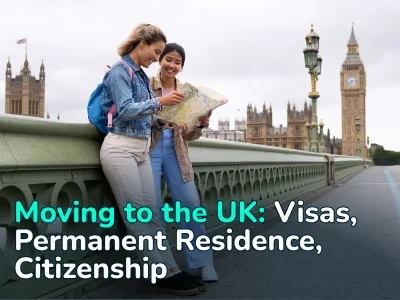
In Which Countries is the EU Blue Card Issued? Comparison of Programs and Conditions for Obtaining
The European Council adopted the EU Blue Card Directive in May 2009. Since then, the program has been constantly evolving to attract more highly qualified specialists to the European Union. In this article, we will look at the current conditions for obtaining the EU Blue Card, the rights of its holders, and recent changes to the program.
What is the EU Blue Card?
The EU Blue Card is a residence permit for skilled workers from non-EU countries, allowing them to work and live in an EU country. It simplifies procedures and improves the legal status of those already in the EU.
In which countries can you get an EU Blue Card?
The EU Blue Card is available in 25 EU member states. Denmark, Ireland, and the UK (after Brexit) do not participate in this program. The EFTA countries (Norway, Liechtenstein, Iceland, and Switzerland) also do not issue the EU Blue Card.
|
Country |
Validity period |
Salary threshold |
Commission |
|
Austria |
24 months |
58,434 EUR |
120 EUR |
|
Belgium |
13 months |
54,115–57,019 EUR |
215 EUR |
|
Bulgaria |
48 months |
7800 EUR |
55 EUR |
|
Croatia |
no data |
19,338 EUR |
137 EUR |
|
Cyprus |
no data |
0 EUR |
0 EUR |
|
Czech Republic |
24 months |
~24,500 EUR |
92 EUR |
|
Estonia |
27 months |
26,064 EUR |
120 EUR |
|
Finland |
24 months |
60,828 EUR |
550 EUR |
|
France |
48 months |
53,836 EUR |
269 EUR |
|
Germany |
48 months |
56,400 EUR |
110 EUR |
|
Greece |
24 months |
30,675 EUR |
300 EUR |
|
Hungary |
no data |
18,310 EUR |
60 EUR |
|
Italy |
24 months |
24,790 EUR |
100 EUR |
|
Latvia |
60 months |
20,580 EUR |
100 EUR |
|
Lithuania |
36 months |
13,140 EUR |
114 EUR |
|
Luxemburg |
24 months |
83,628 EUR |
80 EUR |
|
Malta |
12 months |
16,036 EUR |
255 EUR |
|
Netherlands |
48 months |
68,040 EUR |
285 EUR |
|
Poland |
24 months |
23,810 EUR |
111 EUR |
|
Portugal |
12 months |
24,535 EUR |
103 EUR |
|
Romania |
24 months |
27,000 EUR |
174 EUR |
|
Slovakia |
48 months |
15,102 EUR |
170 EUR |
|
Slovenia |
24 months |
28,006 EUR |
102 EUR |
|
Spain |
12 months |
33,908 EUR |
418 EUR |
|
Sweden |
24 months |
53,200 EUR |
175 EUR |
What does the EU Blue Card Provide?
Compared to regular national work permits, the EU Blue Card has a number of advantages:
- Residence and work for one to four years in the Member State that issued the card. The card is renewable.
- Equal treatment with EU Member State nationals in terms of working conditions and wages.
- Free movement within the EU.
- Possibility to visit other EU countries for up to three months within a six-month period.
- Right to move to another EU country to work as a highly qualified specialist after 18 months in the first country.
- Possibility of family reunification.
- Right of permanent residence after 33 months of work in the first host country or 21 months upon reaching language level B1.
- Possibility to return to the country of origin or other non-EU countries for up to 12 consecutive months without losing the right to the EU Blue Card.
How to Get an EU Blue Card? Conditions for Applying
To obtain an EU Blue Card, you must:
- Prove that you have a “higher professional qualification” (higher education or at least five years of relevant professional experience).
- Be employed (the card does not apply to self-employed persons or entrepreneurs).
- Have an annual gross salary exceeding the threshold set in the country (usually 1.5 times the average annual gross salary, or 1.2 times for professions in shortage).
- Provide an employment contract or a binding job offer in an EU country for at least 1 year.
- Have the necessary travel documents and health insurance for yourself and your family members.
- Prove that you meet the legal requirements for practicing your profession, if it is regulated.
- Do not pose a threat to public order, security, or health in the host country.
Application Process
You or your employer must apply for an EU Blue Card to the competent national authorities of the country where you plan to work. A decision on the application must be made within 90 days from the date of its registration.
The standard application fee is €140 and the renewal fee is €100, but may vary depending on the country.
Recent Changes to the EU Blue Card Program
In 2024, several EU countries have simplified their rules for obtaining a Blue Card:
Greece (since June 2024):
- Allowed visa-free or short-term Schengen visa holders to apply.
- Made pre-screening optional.
- Set an initial fee of €300 and an extension fee of €450.
Estonia (since April 2024):
- Allowed applications from people with 5 years of professional experience without the need to present educational qualifications.
- Reduced the requirements for the duration of the job offer and the period of employment.
- Increased the unemployment period to 3 months for card holders of less than 2 years and to 6 months for holders of more than 2 years.
- Simplified the procedure for changing employers without the need to check the labor market.
Italy:
- Allowed employers to submit online applications for foreign workers.
- Set the minimum salary threshold at around €24,790.
- The fee for issuing and renewing the card is €100.
Slovakia (since 15 June 2024):
- Expanded opportunities for recognition of professional experience.
- Increased the validity period of the card from 4 to 5 years.
- Reduced the minimum wage requirement to 1.2 times the national average wage.
Sweden (planned changes):
- Plans to lower the minimum wage threshold from 1.5 to 1.25 times the average monthly salary (about €4,300 instead of €5,200).
- Plans to simplify the transition from Swedish residence and work permits to the EU Blue Card.
- Plans to simplify the procedure for obtaining a Swedish EU Blue Card for cardholders from other EU countries.
These changes are aimed at attracting more highly qualified specialists to EU countries and simplifying the process of obtaining a Blue Card.
Frequently Asked Questions about the EC Blue Card
In which countries is the EU Blue Card program valid?
How much does it cost to get an EU Blue Card?
Can I change employers with an EU Blue Card?
How long does it take to process an EU Blue Card application?
Can I apply for an EU Blue Card while already in an EU country?
What if I lose my job while holding an EU Blue Card?
Author
I am responsible for editorial work. I write expert interviews and guides.


























